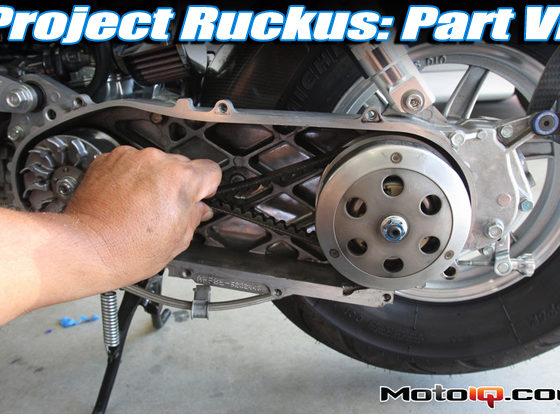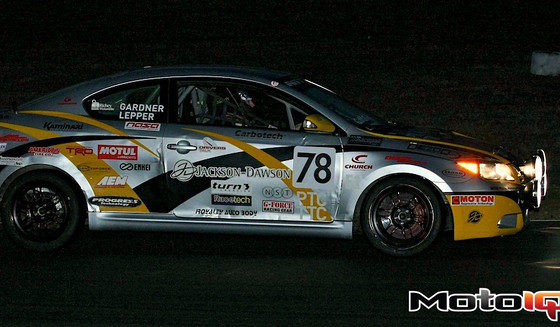
The Best-Engineered Cars of LeMons #3
Part II: the Angry Hamster Gets an Engine
Last week, we introduced you to the Angry Hamster, and showed you how much cutting and welding it takes to put an RX-7 suspension in a Honda Z600. Today you'll see what it takes to go from front-engine to mid-engine, from front-drive to rear-drive, and to quadruple the horsepower. its both easier, and harder than you might think.
If none of this makes any sense to you, go back and read Part I.
 |
||
|
The Magna packs an 1100cc V4 with a driveshaft going down the left side. The package is seemingly perfect to sit in the Hamster's passenger's seat and drive the rear wheels. Everything else about the bike is just plain gross. in spite of this, most of the bike was paid for by selling off parts to people with bad taste. |
 |
||
| First, the bike was removed from around the drivetrain, and the important bits were sorted out. Bench testing your powerplant like this is pretty easy when it will actually fit, and run, on a bench. Various bits of the harness, like the instrument cluster, had to be extended to reach their new homes in the car. That added $2 of wire to the tally. |
 |
||
| When youre planning to fabricate as much of the car as these guys did, you have the freedom to make some very basic decisions. See that silver “CL” in the foreground? That's the centerline of the car. See that engine in the background? It's sitting right on the centerline… |
At first blush, a shaft-drive motorcycle seems to be the perfect solution to power a shaft-drive car. At second blush, it becomes painfully apparent that the motorcycle's driveshaft rotates the wrong direction. Oops.
If it were me, I'd simply mount the RX-7 axle upside-down. Tim didn't want to deal with rearranging all those links, having to figure out how to lubricate the pinion shaft, which would now sit above the oil level (I'd just over-fill it), and putting load through the wrong side of the gear teeth. Tim could be so picky because he could actually pull this off:
 |
||
|
Turns out NASCAR quick-change rear end gears have a finite service life, after which they're likely to fail, and therefore useless for any team serious enough to have a need for them. $20 on eBay, then, and still plenty strong enough for this contraption. Cheap, Russian bearings can be had for $5, especially if you aren't picky about size. You can not be picky about size when you're about to fabricate, from scratch, everything the bearings will touch. Oh yea, the picture. That thing on the left is the output spline from the Magna's transmission. Somehow drive from that spline needs to get to the entirely different spline in the gears, the gears need to be supported in some kind of case, and the other gear needs to get its output to the RX-7 diff. Read on, in slack-jawed amazement. |
 |
||
| Its at this point that it becomes painfully obvious these guys are working on a very different level from the rest of us. Input shaft made from scratch on the right. Output shaft made from scratch on the left. In the background, that's $12.26 worth of scratch. |
 |
||
| In case it wasn't obvious those really coarse splines fit the quick change gears. The threads are for the nut that will hold the big gear in place. |
 |
|||
| Now, | how to get that little motocycle spline to drive this input shaft if you don't have the very specialized broach for cuting inside splines? Naturally, you use the inside spline Honda gave you, originally as part of the U-joint living at the front of the bike's driveshaft. Tim cut it off, then machined these wavy splines on the outside. Nice wavy splines that minimize stress concentrations and match…. |
 |
||
| …these splines that he could mill into the input shaft without the need for any special tools. |
 |
||
| The wavy bit is a perfect press fit into the input shaft. |
 |
||
| If, like me, the first time you saw the input shaft it was already assembled, you wouldn't even know these were two separate parts. |
 |
||
| The finished gearbox is alarmingly expensive looking for a LeMon. I had recommended making it out of old beer cans, or from a chunk of steel that he could then bury in wet sand for a month to give it the proper patina. Technically, I guess, it is made from old beer cans, but this isn't really what I meant. |
 |
||
| Look carefully and you'll finally understand the big, flat flange on the end of the output shaft. That's where the Jeep U-joint bolts on. |
 |
||
| Mounted in its final resting place, the gearbox's second purpose becomes clear. It moves the driveshaft closer to the centerline of the car. (While we're here, note how the engine is finally mounted to the car. The motorcycle's frame is actually welded into the car, and the engine bolts in as designed by Honda.) |
 |
||
| The driveshaft is actually a scrap front driveshaft from Tim's Jeep. Desipte the gearbox, the angle is still surprisingly steep. Imagine how bad it would be without the box! |



